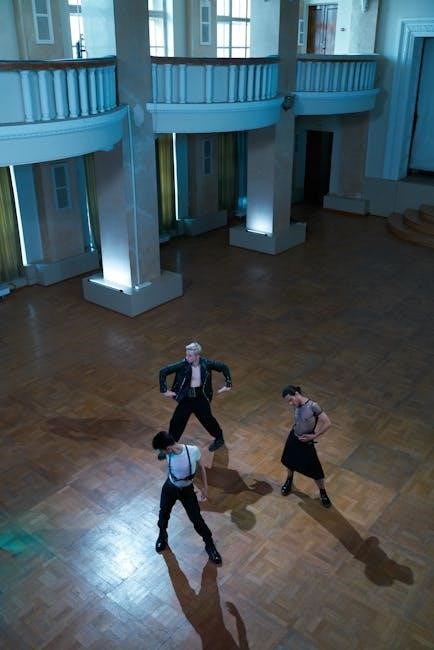Overview of a Motion to Change Venue
A motion to change venue is a legal request to transfer a case to a different court, ensuring fairness, convenience, or proper jurisdiction.
1.1 Definition and Purpose
A motion to change venue is a formal legal request to transfer a case to a different court location. Its primary purpose is to ensure impartiality, convenience, or proper jurisdiction. Filed using specific forms like JDF 1323, it addresses issues such as improper venue, witness availability, or bias, aiming to facilitate a fair trial environment.
1.2 Legal Context and Importance
A motion to change venue is a critical legal procedure ensuring cases are heard in the most appropriate court. It addresses issues like impartiality, convenience, and proper jurisdiction, safeguarding fairness. Properly filed with forms like JDF 1323, it balances legal rights with practical considerations, such as witness availability or bias, maintaining the integrity of judicial proceedings.
Forms and Documents Required
Key forms include the JDF 1323 (Motion to Change Venue) and EOIR-33 (Change of Address). Properly completed, these documents ensure the request is legally valid and processed efficiently.
2.1 JDF 1323 Form (Motion to Change Venue)
The JDF 1323 form is specifically used to request a change of venue in legal proceedings. Available in both Word and PDF formats, it must be completed accurately to ensure the motion is considered. This form is essential for formally initiating the venue change process and must be filed with the appropriate court. Proper submission ensures legal validity and procedural efficiency.
2.2 EOIR-33 Form (Change of Address/Contact Information)
The EOIR-33 form is required to update contact information in immigration cases. Each family member must complete a separate form. It must be filed within five working days of any address change or receipt of a charging document. This form is essential for ensuring the court has accurate contact details, which is crucial for processing a motion to change venue effectively.

Legal Standards for Filing a Motion
A motion to change venue must meet specific legal standards, such as improper venue, convenience of parties and witnesses, or avoiding bias. Proper documentation is required.
3.1 Improper Venue
A case may be transferred due to improper venue, meaning the current court lacks jurisdiction or is an inconvenient location. Filing a motion to change venue under forms like JDF 1323 or EOIR-33 is required, ensuring the case is heard in the correct jurisdiction. Improper venue can lead to dismissal or transfer, and the motion must demonstrate why the current location is unsuitable. Proper documentation, such as affidavits, may be needed to support the claim. The goal is to ensure fairness and prevent prejudice by moving the case to a more appropriate court. Timely filing is crucial to avoid procedural delays.
3.2 Convenience of Parties and Witnesses
A motion to change venue may be granted based on the convenience of parties and witnesses. This considers factors like travel burdens, availability of evidence, and the ability of witnesses to testify. Proper documentation, such as affidavits, is required to demonstrate how relocating the case would facilitate a smoother trial process. Forms like JDF 1323 and EOIR-33 are essential for formalizing this request, ensuring all parties’ needs are addressed fairly and efficiently, while maintaining the integrity of the legal proceedings. This approach helps balance the interests of all involved, ensuring the case progresses without unnecessary delays or hardships.
3.4 Avoiding Bias or Prejudice
A motion to change venue may be filed to avoid bias or prejudice, ensuring a fair trial. This is often due to pretrial publicity, community sentiment, or perceived judicial impartiality. The court evaluates whether an impartial jury can be formed. Documentation, such as affidavits or evidence of media coverage, supports this claim. Forms like JDF 1323 and EOIR-33 are used to formalize the request, emphasizing the need for neutrality in proceedings to guarantee justice.

Steps to File a Motion to Change Venue
Filing involves preparing the motion, submitting it to the court, and serving it to all parties. Proper documentation and adherence to procedural timelines are essential for consideration.
4.1 Preparing the Motion
Preparing the motion involves obtaining the correct forms, such as JDF 1323, and filling them out accurately. Include all required information, such as case details and reasons for the venue change. Attach supporting documents, like affidavits or proof of residency, to substantiate the request. Ensure proper formatting and completeness to avoid delays or rejection.
4.2 Submitting the Motion to the Court
Submit the completed motion to the court where the case is currently pending. Ensure the form, such as JDF 1323, is properly filled out and filed within the required timeframe. Serve copies to all parties involved and verify receipt. The court will process the motion, which may take several weeks or months depending on the case load.
4.3 Serving the Motion to All Parties
Serve the motion and supporting documents to all parties involved, ensuring each receives a copy. Use certified mail or personal delivery for proper notification. File proof of service with the court. Each family member must submit separate forms, like EOIR-33, and appear at hearings until the motion is resolved. Notify the court of any contact changes.

Required Documentation and Evidence
Required documentation includes Form JDF 1323, EOIR-33, affidavits, witness statements, and proof of residency. Submit these to support the motion and demonstrate valid reasons for the venue change.
5;1 Affidavits and Witness Statements
Affidavits and witness statements are crucial evidence. They provide personal testimony and factual support for the motion, establishing credibility. Include Form JDF 1323 and EOIR-33 to validate the request.
5.2 Proof of Residency or Venue Change Reasons
Proof of residency, such as utility bills or lease agreements, must accompany the motion. Supporting documents like Form JDF 1323 and Form EOIR-33 validate the request. Evidence showing why the venue change is necessary, such as witness availability or bias concerns, strengthens the case. All materials must be notarized and submitted to the court.
Opposition to the Motion
Parties may file a formal response opposing the motion, citing reasons like inconvenience or prejudice. The court reviews objections before making a decision.
6.1 Responding to the Motion
Parties opposing the motion must file a formal response, outlining legal arguments against the venue change. The response should include evidence, such as affidavits or witness statements, to counter the movant’s claims. The opposing party must demonstrate how the change would cause inconvenience, prejudice, or other harm, ensuring the response is filed timely and served to all parties involved.
6.2 Court Consideration of Opposition
The court reviews the opposing party’s arguments and evidence, assessing whether the motion should be granted or denied. Judges weigh factors like convenience, prejudice, and jurisdictional issues. If necessary, a hearing may be held to address concerns. The court’s decision is based on legal standards and the strength of the opposition’s case, ensuring fairness and procedural integrity.

Court Decision and Outcome
The court issues a final ruling, either granting or denying the motion. The decision impacts case proceedings, potentially transferring files or rescheduling hearings based on the outcome.
7.1 Factors Influencing the Judge’s Decision
The judge evaluates improper venue, convenience of parties, and potential bias. Evidence and arguments presented in the motion, along with the opposing party’s stance, are critical. Proper documentation, such as affidavits and proof of residency, significantly impacts the decision. The court also considers the availability of witnesses and the potential prejudice to either party if the venue remains unchanged.
7.2 Consequences of a Granted or Denied Motion
If granted, the case is transferred, altering trial location and potentially affecting witness availability. A denied motion means proceedings continue in the original venue, requiring parties to adapt. Both outcomes significantly impact legal strategies, resource allocation, and the overall timeline of the case, ensuring fairness and judicial efficiency are maintained throughout the proceedings.

Case Examples and Precedents
Notable cases, like Karina Cooper’s denied motion, illustrate real-world applications and judicial discretion in deciding venue changes, providing insights into the motion’s practical implications and legal standards.
8.1 Notable Cases Where Venue Was Changed
In a notable case, a respondent successfully changed venue to the El Paso, Texas Immigration Court, citing convenience and fairness. Another case involved a child custody matter where the court granted a venue transfer due to improper jurisdiction, ensuring the case proceeded in the correct legal jurisdiction, highlighting the importance of proper filing and legal standards in such motions.
8.2 Cases Where the Motion Was Denied
In Karina Cooper’s case, the judge denied the motion for change of venue without prejudice, citing insufficient grounds for bias or prejudice. Similarly, a Waukon man’s motion was denied due to lack of compelling evidence, demonstrating that courts require strong justification to alter venue, ensuring fairness and adherence to legal standards in such decisions.

Consequences of a Successful Motion
A successful motion results in transferring court files and rescheduling hearings, ensuring the case proceeds in the new venue with updated documentation and procedures.
9.1 Transfer of Court Files
A successful motion leads to the official transfer of all case files to the new venue, ensuring all documents and records are updated and accessible in the designated court.
9.2 Rescheduling of Hearings
Upon granting a motion to change venue, the court typically reschedules hearings to accommodate the new location, ensuring all parties are notified and arrangements are made for the proceedings.
A motion to change venue ensures fairness and convenience, requiring proper documentation and adherence to legal standards to achieve a successful transfer or hearing rescheduling.
10.1 Final Thoughts on the Motion to Change Venue
A motion to change venue is a critical legal tool ensuring fairness and convenience. Proper documentation, like JDF 1323 and EOIR-33 forms, is essential for a successful outcome. Judges consider factors such as jurisdiction, witness availability, and bias when deciding. A granted motion transfers the case, potentially impacting trial dynamics and outcomes, while a denial upholds the original venue, emphasizing the importance of thorough preparation and adherence to legal standards.
10.2 Importance of Proper Documentation and Procedure
Proper documentation and adherence to legal procedures are vital for a motion to change venue. Accurate forms like JDF 1323 and EOIR-33 ensure compliance with court requirements. Missing steps or incomplete filings can delay or deny the motion. Thorough preparation and adherence to legal standards guarantee a fair and efficient process, minimizing potential errors and ensuring the court’s consideration of the request.

